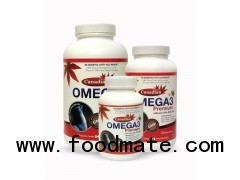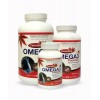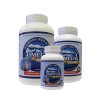Canadian Omega 3 - Essential nutrients for maintaining both good mental and physical health.
Scientific research has identified the benefits of omega-3 marine oils on cardiovascular and circulatory health, as well as possible benefits to infant development and in the treatment of neurological aliments. Omega-3 fatty acids are essential for normal growth, development and may play a role in the prevention and treatment of hypertension, arthritis, inflammatory and auto immune disorders, diabetes and cancer of the breast and prostate. One of the richest sources of marine Omega-3 comes from the Harp seal- a mammal found abundantly in the waters of Newfoundland and Labrador. Because of their environment, Harp Seal have unique biological characteristics that make them valuable as a renewable resource to be harvested for human consumption. The interest in marine oils stemmed from observation of the diet of Greenland Inuit where seal meat and fats was an
Benefits of Seal oil
As early as 1908 the Danish doctors Krogh and Krogh studied the Greenland diet. They demonstrated that Greenlanders were the most meat-eating population known that time. The Danish doctors Bang and Dyerberg confirmed this in the studies they made between 1970 and 1979. They found that certain polyunsaturated fatty acids, omega-3 fatty acids, are rich represented in the diet which consists mainly of seal meat, blubber and small whales. These polyunsaturated omega-3 fatty acids may explain the low incidence of cardiovascular diseases in this population. In 1958, research conducted by C.M. Harlow et al., at the Dalhousie University Medical Research Committee revealed that a further lowering of cholesterol could be obtained by adding 50 grams of seal oil (450 calories) to the diets of ten patients with atherosclerosis and hypercholesterolemia, who were already on a low-fat diet (5%) Role of Omega-3 - DPA (docosapentaenoic acid) is naturally present in human milk. It is postulates to be and essential fatty acid for infant nutrition and development. Seal oil is one of the few know natural sources of DPA. In contrast, fish oils have little or no DPA. Recent studies show that DPA is involved with the healing process associated with cardiovascular disease, namely atherosclerosis and thrombosis. - DHA (docosahexaenoic acid) has been identified as an essential fatty acid in brain, nerve and eye tissue. It is especially
 The superiority of Seal Oil
The superiority of Seal Oil
Seal oil is a superior source of omega-3 compared to fish in many ways. DPA is present at very low levels in fish oils relative to EPA or DHA but is most as
 Omega-3 in disease prevention
Omega-3 in disease prevention
- Heart disease: Research has indicated that omega-3 can reduce the risk of primary cardiac arrest by 70%, by reducing blood vessel blockages. Other work (Dr. Leof of Harvard Medical School) has found that PUFAs can prevent sudden death from irregular heart beats following a heart attack. Another study has found that a diet rich in omega-3 can reduce chances of a second (fatal) heart attack by 30%. The results are primarily from the fact that omega-3 makes the walls of the blood vessels smoother and more elastic thus reducing vessel blockages that are often the cause of heart problems. - Mental Illness: A British study claims that up to 80% of schizophrenics are deficient in unsaturated fatty acids like omega-3. Omega-3 deficiency has also been liked to depression and general mental deterioration. - Arthritis: More than a dozen studies confirm that omega-3 offers anti-inflammatory relief for arthritis sufferers. - Diabetes: A disorder characterized by high blood levels of glucose in the blood. Diabetes can damage the large blood vessels increasing the risk of stroke, heart attack, and in the limbs, gangrene. Many studies now suggest that omega-3 is invaluable in combating circulation problems associated with diabetes by rendering the walls of the veins and arteries smooth and more elastic. - Reduces cholesterol: A person with a high level of cholesterol came to the National hospital in Nuuk. He had tried different diets and medicinal treatment, but his cholesterol count was still higher than was good for him. He was urged to eat only traditional Greenland food. In just a month his cholesterol count fell by a whole 70%.









